December 6, 1977
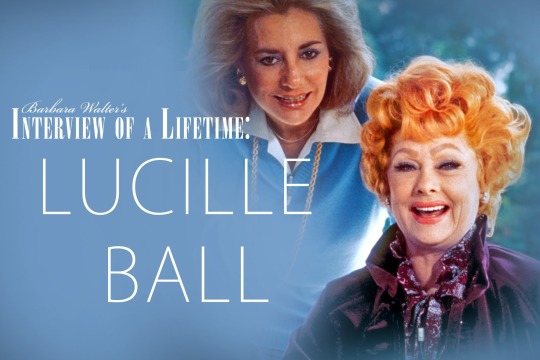
Barbara
Walters
(Host) was born in Boston in 1929. She first
became known as a television personality in the early 1960s, when she
was a writer of ‘women’s interest stories’ on “The
Today Show.”
In
1976, she became the first female co-anchor of a network evening news
on
the “ABC Evening News.” From 1979 to 2004, she worked as co-host
and a producer for the ABC news magazine “20/20.” In
1997, Walters created and co-hosted “The
View,”
a daytime talk show with an all-female panel. She retired as a
co-host in 2014, but still serves as executive producer. In 1996,
Walters was ranked #34 on the
TV
Guide “50
Greatest TV Stars of All Time” list. Lucille Ball was #1. In
2000 she received a Lifetime Achievement Award from the National
Academy of Television Arts and Sciences. In 2001, she appeared on “I
Love Lucy’s 50th Anniversary Special.”
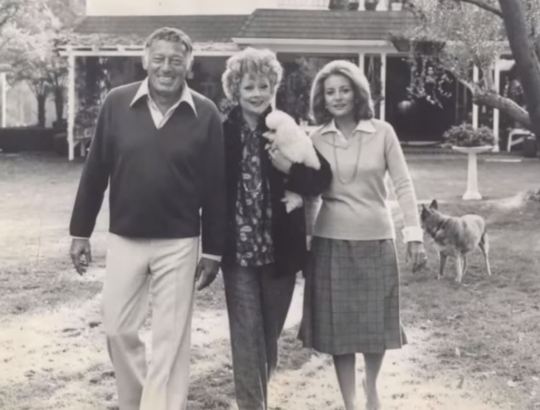
Lucille
Ball was
born on August 6, 1911 in Jamestown, New York. She began her screen
career in 1933 and was known in Hollywood as ‘Queen of the B’s’
due to her many appearances in ‘B’ movies. With Richard Denning,
she starred in a radio program titled “My Favorite Husband” which
eventually led to the creation of “I Love Lucy,” a television
situation comedy in which she co-starred with her real-life husband,
Latin bandleader Desi Arnaz. The program was phenomenally successful,
allowing the couple to purchase what was once RKO Studios, re-naming
it Desilu. When the show ended in 1960 (in an hour-long format known
as “The Lucy-Desi Comedy Hour”) so did Lucy and Desi’s
marriage. In 1962, hoping to keep Desilu financially solvent, Lucy
returned to the sitcom format with “The Lucy Show,” which lasted
six seasons. She followed that with a similar sitcom “Here’s
Lucy” co-starring with her real-life children, Lucie and Desi Jr.,
as well as Gale Gordon, who had joined the cast of “The Lucy Show”
during season two. Before her death in 1989, Lucy made one more
attempt at a sitcom with “Life With Lucy,” also with Gordon,
which was not a success and was canceled after just 13 episodes.
Gary Morton was a comedian who worked the famed ‘Borscht Belt’ in the Catskills Mountains. He met Lucille Ball shortly after her divorce from Desi Arnaz and they married in November 1961. At her request, Morton gave up his nightclub career and became a producer of “The Lucy Show.” Morton also served as a warm-up comic for the show’s studio audience. He appeared in several episodes of both “The Lucy Show” and “Here’s Lucy.” Morton passed away in 1999.
Lucie
Arnaz (Archive
Footage)
Desi
Arnaz Jr.
(Archive Footage)
Desi
Aranz Sr.
(Archive Footage)
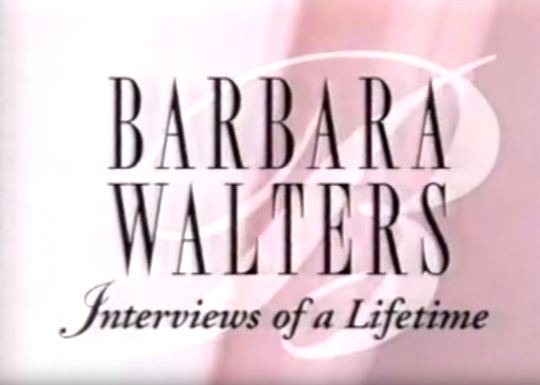
Earlier
in the evening of December 6, 1977, ABC aired new episodes of “Laverne and Shirley”
(a show often compared to the antics of Lucy and Ethel) and “Three’s
Company” (a show Ball admired, and hosted a retrospective of in
1982).
When
the show was repackaged for the Lifetime Network, Barbara Walters
taped a new introduction and conclusion to the interview as well as
new voice-over narration, referencing events from 1977 to Ball’s
death in 1989. She introduces the show by telling viewers that Lucy
talked frankly about her failed marriage to Desi Arnaz, with her
second husband, Gary Morton, sitting beside her.
Portions
of the interview were later incorporated into “Barbara Walters:
20 Years at ABC.”
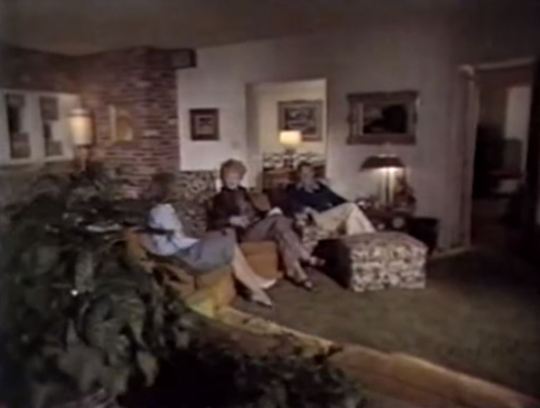
The
interview starts in the living room of Ball’s Roxbury Drive mansion
in Beverly Hills, California.
Lucy:
“There’s
always one room you live in. Play games in. The plants grow better
in.”
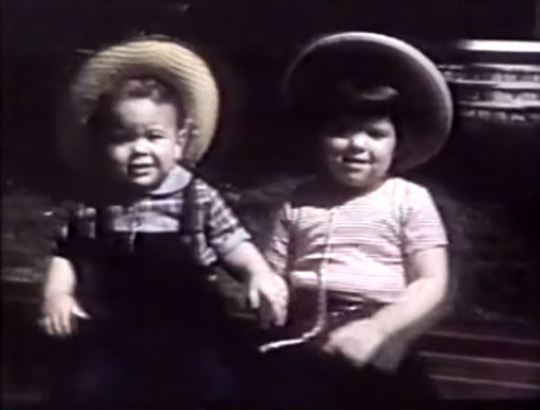
Lucy
tells Walters that they have 85,000 feet of home movies. She screens
one called “The Fat Little Cowboy” starring a two and a half
year-old Desi Jr. and a four year-old Little Lucie. While the film is
being screened in the living room, Lucy tells Walters that the two
are much closer now than they were as children.

Showing
stills of her children in “The Lucy Show” and “Here’s Lucy,”
Walters flashes back (again through still photos) to when Lucy met
Desi Arnaz and the creation of “I Love Lucy.”
Walters: (voice over) “There
has never been a success like Lucy.”
Walters’
narration talks about Lucy’s divorce from Desi in 1960.
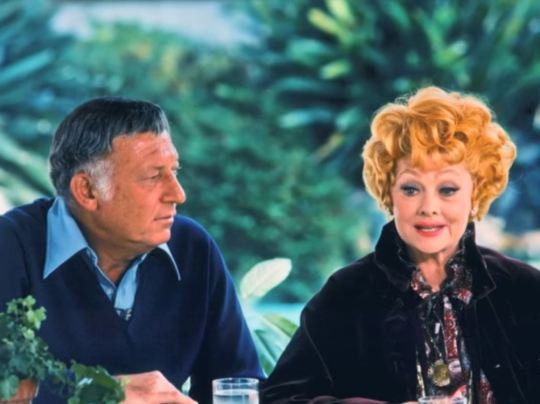
The
interview moves outdoors to the patio, the narration noting that Lucy
was 66 at the time, Desi Arnaz was still alive, and the subject of
the divorce was still painful.
Walters:
“When
you and Desi were married you had everything!”
Lucy:
“We
had nothing. He had his own band and was in a play in New York.”
Ball
firmly tells Walters that while she was acting, Desi was building the
business, although nobody would believe it was him doing the
building. She says he didn’t deserve some of the names they called
him. Lucy asserts there was an anti-Latino bias against Arnaz.
Walters:
“And
then it fell apart.”
Lucy:
“That
was his problem.”
Walters
quotes Lucy as saying that with Gary Morton, she didn’t make the same
mistake twice.
Lucy:
“He’s
not a loser. I married a loser. He could win, win, high stakes. He
worked very hard, but he had to lose. Everything he built, he had to
break down. He still claims he’s the same way.”
Walters
asks whom takes care of whom. Gary says they take care of each other,
but Lucy insists it is all Gary.
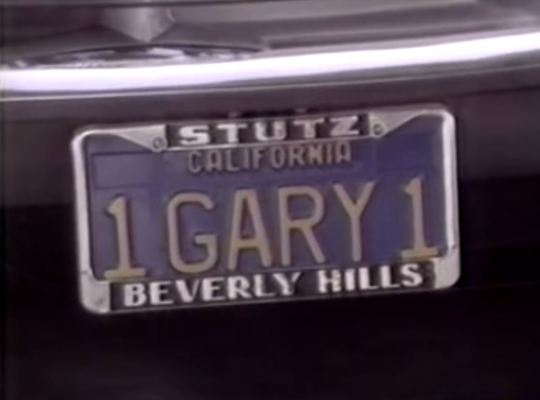
When first marrying Gary,
she was cautious. She didn’t want to rob him of his individuality.
Lucy mentions that Gary finds solace in golf and that Lucy never
minded that.
Walters
asks if it is true that Lucy doesn’t ‘think funny.’ Lucy agrees
saying she can do funny things other people write down in detail, but
she doesn’t think funny. She and Gary say they make each other laugh.
Gary says she’ll do ‘Lucy-isms’. Lucy gives an example of a
‘Lucy-ism’: when making a chopped chicken liver platter for guests,
the top came off the salt shaker creating a mound of salt atop the
food. To try to fix it, she rinsed it in the sink. They went out to dinner that night.
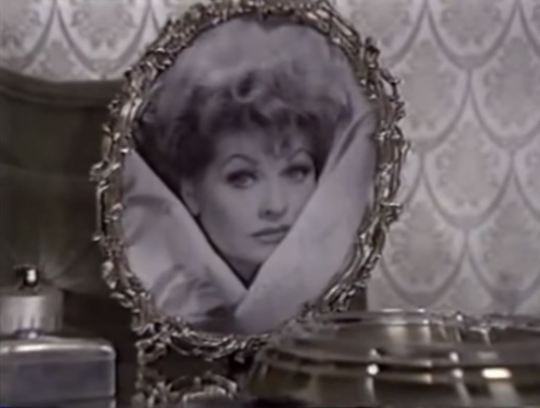
Gary
says Lucy’s best quality is her warmth. Gary is hard-pressed to come
up with her worst quality but Lucy says it is that she hates that he
takes naps.
Lucy
says she lives by the ‘think positive’ ideals of Dr. Norman Vincent Peale.

Walters
asks Lucy what it was like when she stopped doing series television
in 1974. “Traumatic,” says Ball. She thinks she stayed on a bit
too long, but only stuck it out because her children were on the
show. She says she always prided herself on “when to get off.”
Walters wonders if the Lucy Ricardo character could work today as
well is it did 25 years ago. Lucy hints that people may be getting
tired of “the new stuff” and want what they know and want to see
again.
Gary
Morton says that Lucy (the character) is seen all over the world and
there is no limit when something is funny. Lucy says she always felt
her audience needed a show that had a beginning, a middle, and a
happy ending.
Lucy:
“They’re
trying to make entertainment out of newsreels. What we see in news,
which is not very happy these days. To me, that’s not
entertainment.”
Walters
asks Lucy if she ever watches “I Love Lucy” Lucy
says no, but that she sometimes runs across one turning the dial. She
tells Walters about CBS’s reluctance to accept Desi as her husband on
TV. Lucy fully expected the show to end after a just year.
Walters:
“They
say you’re very tough to work for. Are you? Are you a
perfectionist?”
Lucy:
“Perfectionist?
I have an attention to detail. That’s the way I learned my craft.”

Gary
says Lucy tends to be a protective mother. Walters says that Lucy’s
onscreen and off-screen pregnancy was big news, getting bigger
ratings than the inauguration of the President and the coronation of the Queen. Lucy says she wasn’t
aware of any of that because she was busy having the baby, but learned
about it afterwards.
Walters
wondered if she was worried about having a baby so late in life.
Lucy says no one warned her about the risks. Her daughter was born
by by C-section, so Lucy was in pain after the birth and cried with
joy so much that holding her newborn child actually hurt.
Prodded
by Walters, Lucy tells the story of first hearing that she was
pregnant on the radio. Apparently, in 1950, radio gossip columnist Walter
Winchell had spies in the lab and intercepted the results of Lucy’s
pregnancy test before the couple could be notified. Lucy lost the
child.

Walters
wonders how Lucie and Desi Jr. differentiated between their parents’ real
life and their television lives. Gary says they eventually grew up
and realized the difference. Lucy used the fantasy world of their
show as a form of escape from reality. She says “I had to pretend,
but it helped.”
Walters
wraps up the interview (in the updated wrap-around segment) by saying
that Lucy died in 1989, but that her legacy is as one of the greats
of television history.
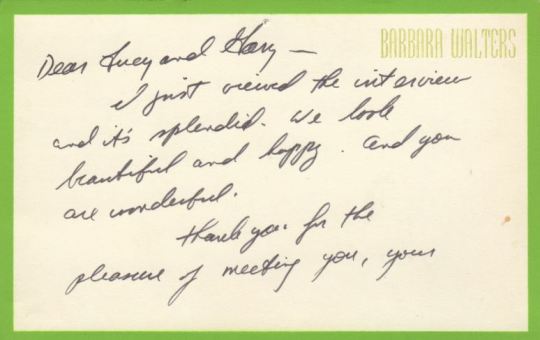
This
Date in Lucy History – December 6th

“Lucy
Wants to Move to the Country”
(ILL S6;E15) – filmed December 6, 1956

“Lucy
Saves Milton Berle”
(TLS
S4;E12) – first aired December 6, 1965

“Lucy
in the Jungle”
(HL S4;E13) – first aired December 6, 1971
Leave a comment